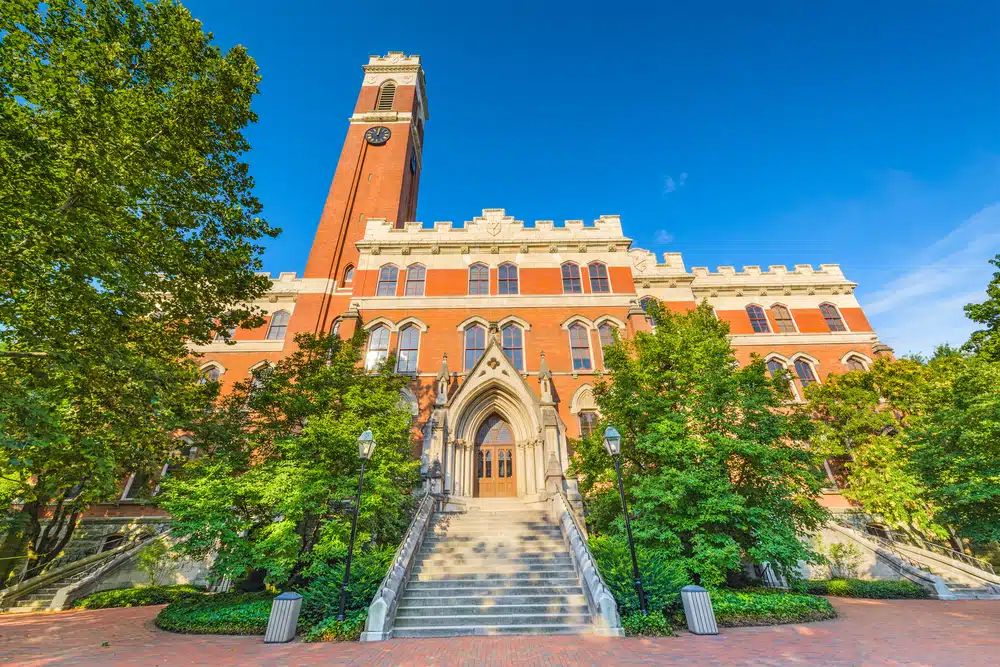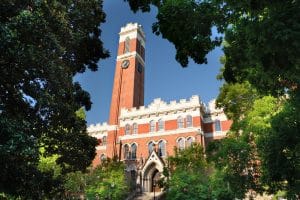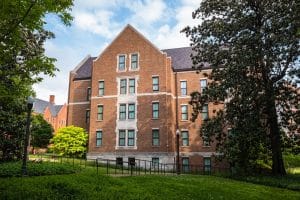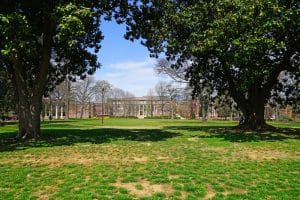Where is Vanderbilt Located?
Vanderbilt University is located in Nashville, Tennessee, and is recognized for its academic programs and research facilities. This institution attracts students globally, aiming to challenge and innovate. This blog will dive into Vanderbilt University’s key features, covering its rich history, cultural significance, global research contributions, and active community participation. Read on to learn how Vanderbilt shapes students’ futures and contributes to the broader community.
Where is Vanderbilt located?
Vanderbilt University, located in Nashville, Tennessee, connects you directly with significant health care, technology, and entrepreneurship opportunities.
The city’s status as a healthcare hub and its growing technology sector offer internships, projects, and potential job opportunities. Through partnerships with local businesses, Vanderbilt enables you to engage in meaningful projects and even start your venture while studying.
Nashville’s Cultural Scene
Nashville, known for its music and arts, offers experiences beyond traditional academics. Museums, art galleries, and music venues across the city provide creative outlets and inspiration. Events like the CMA Music Festival and Nashville Film Festival invite you to participate in the city’s rich cultural life.
Career and Networking in Nashville
Being in Nashville places you in the middle of a vibrant economy with sectors in health care, entertainment, and education. Vanderbilt’s Career Center and alumni network offer connections to internships and jobs, helping lay the foundation for your future.
Community Engagement in Nashville
Vanderbilt encourages you to engage with the Nashville community through volunteering and community service. These activities contribute to your personal growth and instill a sense of social responsibility.
Is Vanderbilt private or public?
Vanderbilt University is a private research university. Its private status influences every part of your education, from class sizes to resource availability, positively affecting your academic and personal development.
Faculty and Academic Programs
At Vanderbilt, you’ll be taught by leading experts from a wide range of disciplines. The university’s private status helps it draw in these renowned scholars, making your education both up-to-date and captivating. With rigorous programs in the arts, sciences, engineering, and business, Vanderbilt challenges you to excel. Its curriculum’s adaptability ensures you’re always at the forefront of educational trends, equipping you with the latest knowledge.
A Supportive Community
Vanderbilt’s low student-to-faculty ratio means you receive personalized attention in your studies and research. The university’s residential college system promotes a community where you can participate in extracurricular activities and leadership opportunities from the start.
Resources and Personalized Education
Vanderbilt invests in resources like labs, libraries, and facilities to support your interests. This investment is typical of private institutions, where financial autonomy prioritizes student needs. Thanks to the dedicated advisors and faculty, your education here is tailored to your interests and career goals. This ensures you’re prepared academically and for your future career.
The Impact of Vanderbilt’s Private Status
Vanderbilt’s commitment to a comprehensive educational experience is tied to its private status, ensuring an environment conducive to intellectual, social, and personal growth. Vanderbilt exemplifies how private universities can prepare future leaders through focused attention, community support, and advanced research. Its unique benefits, stemming from its private status, make it a compelling choice for your college education.
A Brief History of Vanderbilt
Vanderbilt University began in 1873 with Commodore Cornelius Vanderbilt’s $1 million donation, aimed at helping the United States heal post-Civil War. Located in Nashville, Tennessee, Vanderbilt is a leading university where excellence meets innovation, known for its research, medicine, and liberal arts programs.
Vanderbilt’s Early Days
Without any connection to the South, Commodore Vanderbilt funded the university to support reconciliation after the Civil War. His donation established Vanderbilt in Nashville, Tennessee, as a learning institution.
Growth Through the Years
The 20th century marked Vanderbilt’s expansion. It launched graduate programs and added law, medicine, and nursing schools. World War II saw the university training naval officers and partnering with the government for scientific research, emphasizing its commitment to research excellence.
Facing Change Head-On
In the 1960s, Vanderbilt led desegregation in Southern higher education by admitting African American students, aligning with its values of equality and justice. The Vanderbilt community also participated actively in the civil rights movement.
Today’s Vanderbilt
Vanderbilt is globally recognized, blending liberal arts with research. Its Medical Center is a leader in healthcare innovation, and Peabody College ranks among the top education schools. Opportunity Vanderbilt ensures education access for students from all financial backgrounds.
Keeping Up with the Times
Vanderbilt invests in interdisciplinary research, addressing global challenges by collaborating across fields. Projects like the Vanderbilt Brain Institute underscore its commitment to solving complex issues.
The university also embraces digital tools to enhance education, maintaining its position in academic innovation. Vanderbilt’s history reflects its principles while showcasing continuous progress. It’s a place where leaders are prepared to address global challenges. Vanderbilt’s evolving story is compelling, highlighting education’s role in societal transformation.
How big is the Vanderbilt campus?
Vanderbilt University is located in Nashville, Tennessee, and covers 333 acres. It combines historic buildings and modern facilities, emphasizing green building practices and sustainability.
Architecture
You’ll find historic and modern buildings at Vanderbilt. The Engineering and Science Building supports research and highlights Vanderbilt’s commitment to sustainability.
Green Initiatives
The campus features green areas and gardens, acting as outdoor classrooms for those interested in ecology and sustainability.
Learning Resources
The Jean and Alexander Heard Libraries offer over 4 million volumes. Specialized research centers support innovation.
Student Life
Vanderbilt’s residential college system integrates living and learning, supporting academic and personal growth through various programs.
Culture and Recreation
Venues like the Fine Arts Gallery, the Blair School of Music, and sports facilities provide artistic and athletic engagement opportunities.
Future Plans
Vanderbilt continues to focus on enhancing educational spaces, research capabilities, and community engagement, focusing on inclusivity, sustainability, and innovation.
Vanderbilt University’s campus supports academic pursuits, personal growth, and community engagement through its facilities and initiatives.
What are the available facilities inside Vanderbilt?
Vanderbilt University offers extensive facilities to its community, categorized into research, clinical, athletic, and recreational resources. Here are some of the facilities available:
- Laboratory Facilities: Faculty have individual labs, with behavioral research mainly conducted in Wilson Hall, equipped for various types of experimental research.
- Vanderbilt Kennedy Center: Labs for research with special populations.
- Medical Center: Labs for brain imaging, Near Infrared Spectroscopy, and Positron Emission Tomography.
- Animal Research Facilities: An AAALAC-accredited animal care facility in Wilson Hall.
- Electronics and Machine Shop: Fabrication and repair services for lab equipment.
- Graphic Artist Facilities: Access to graphic artists and technology for research material production.
- Adult Psychiatry Clinic: A research clinic within the Vanderbilt University Medical Center, providing comprehensive clinical services.
- Magnetic Resonance Imaging (MRI): Advanced MRI research capabilities with a Philips Intera Achieva 3T scanner.
- Positron Emission Tomography (PET): Facilities for PET studies with a GE Advance PET scanner.
- David Williams II Recreation and Wellness Center: Comprehensive wellness and recreational services.
What is Vanderbilt known for?
Choosing the right university is an essential decision that influences your future. Vanderbilt University, located in Nashville, Tennessee, offers academic excellence, innovative research, and a supportive community.
Academic Strengths at Vanderbilt
Vanderbilt University promotes interdisciplinary learning with a low student-to-faculty ratio for personalized attention. The university encourages you to solve real-world problems and engage in research across various fields like economics, engineering, music, and humanities. Graduate law, medicine, nursing, education, and business programs are designed to challenge, inspire, and prepare you for success.
Innovation at the Forefront
Discovery Vanderbilt highlights the university’s dedication to research and innovation. Projects range from medical breakthroughs to technological advancements, enhancing the academic community and the world.
A Community Unlike Any Other
The residential college system at Vanderbilt fosters a close community, encouraging interaction across disciplines and building a supportive network.
Nashville as a City of Culture and Creativity
Nashville enriches your Vanderbilt experience with its culture. The city offers opportunities for cultural immersion, internships, and community service.
Diversity and Inclusion as Core Values
Vanderbilt values diversity and inclusion, with a community of students from various backgrounds, fostering an environment of respect and understanding.
Athletics and Extracurriculars
Vanderbilt provides athletic facilities and clubs for a balanced college experience. The Commodores and a variety of interests ensure there’s something for everyone.
A Leader in Healthcare
Located at Vanderbilt University, the university’s medical center is a leader in healthcare innovation and patient care, shaping the future of healthcare.
What is outside the Vanderbilt campus?
Nashville, Tennessee’s capital, is famous for its music and for its green spaces. If you’re studying at Vanderbilt University, you’re in luck because the city has lots to offer, from parks to trails. Here’s a look into some places you might enjoy outside your campus.
1. Centennial Park
Centennial Park offers 132 acres of beauty, featuring a replica of the Greek Parthenon. The park has plenty of space for picnics, trails for jogging, and even a dog park. It’s also a venue for live events, showcasing Nashville’s vibrant arts scene.
2. Bicentennial Capitol Mall State Park
Near the State Capitol, Bicentennial Capitol Mall State Park celebrates Tennessee’s history. Walk over a 200-foot granite map of the state, enjoy the Rivers of Tennessee Fountains, and listen to the 95-bell carillon representing the state’s counties. It’s a great place for history buffs and anyone looking to relax.
3. Shelby Park
Shelby Park is an urban retreat with something for everyone. Whether you’re into baseball, soccer, or golf or prefer fishing and boating, this park has you covered. Its trails and green spaces are perfect for a jog or a leisurely walk.
4. Warner Parks
The Warner Parks, comprised of Percy Warner Park and Edwin Warner Park, offer over 3,000 acres of natural beauty. They’re ideal for hiking, birdwatching, and golfing, providing a perfect escape into nature. These parks also host community events, making them a great place to connect with others.
5. Radnor Lake
Radnor Lake State Park is a peaceful spot for those who love nature. It’s dedicated to protecting wildlife and their habitats. The trails here are great for hiking and offer chances to see animals in their natural setting. It’s a live classroom for environmental science students.
6. Riverfront Park
Riverfront Park sits along the Cumberland River and combines green spaces with the city’s skyline. It’s a popular spot for concerts and picnics. The park blends Nashville’s natural beauty with its urban environment, making it a unique place to relax and enjoy the city.
7. Nashville Greenways
The Nashville Greenways connect the city through a network of trails. These are great for biking, jogging, or enjoying a scenic route through different parts of Nashville. It’s a fantastic way to explore more of what the city offers.
Vanderbilt Dorms and Other Housing Options
Vanderbilt University, located in Nashville, has designed a variety of dorm and housing choices to fit your needs and preferences. Whether you’re into modern facilities or traditional dorms, you’ll find a spot that feels like home. Let’s explore these options:
1. Warren and Moore Colleges
Vanderbilt opened Warren and Moore Colleges in August 2014, aiming to create an engaged community for sophomores, juniors, and seniors. Here, you’ll live with resident faculty directors and graduate fellows, exploring personal experiences, social networks, and learning communities. It’s all about connecting with others and growing together.
2. The Martha Rivers Ingram Commons
Every first-year student lives in The Martha Rivers Ingram Commons, which has ten houses. Each house has a faculty head who brings students from different backgrounds together. You’ll celebrate diversity, share perspectives, and explore academic interests. It’s the perfect way to start your college journey on the right foot.
3. Living Learning Communities (LLCs)
If you’re passionate about international topics, leadership, the arts, or more, Living Learning Communities (LLCs) are for you. You can live with others who share your educational interests. Choose from options like Mayfield Lodge, McGill Project, or McTyeire International House.
4. Traditional Residence Halls
Prefer a classic college experience? Vanderbilt offers single and double rooms in halls like Branscomb Quadrangle and Vanderbilt/Barnard. You’ll get the mix of privacy and community that’s a hallmark of college life. These halls are near everything you need on campus, from classes to food.
5. Suites and Apartment-Style Living
If you’re ready for more independence, check out the suites and apartments in places like Carmichael Towers and Chaffin. These options allow you to live how you want, with more space and privacy. They’re perfect for students looking to balance school with a bit more of their own space.
What is Vanderbilt’s impact on Nashville?
Nashville, Tennessee, thrives through its connection with Vanderbilt University. This prestigious institution drives the city’s economy, draws global talent, and contributes to its cultural scene. Here, we explore Vanderbilt’s role in Nashville’s growth, focusing on its economic impact, educational influence, and community involvement.
Vanderbilt University Powers Nashville’s Economy
Vanderbilt University significantly impacts Nashville’s economy, with a nearly $12 billion influence in Tennessee. In recent years, Nashville has seen a 25% increase in its economic contribution, reflecting its music, entertainment, tech, education, and healthcare development.
The Drive Behind Diverse Industries
Nashville is known for its vibrant entertainment scene, but the presence of Vanderbilt University, strategically located in the heart of the city, attracts students, tech startups, and healthcare companies looking to leverage the institution’s resources and talent pool. The university produces graduates equipped to tackle industry challenges, linking academic research with practical solutions.
Boosting Nashville’s Brainpower
Vanderbilt brings scholars worldwide to Nashville, enriching the city’s cultural and intellectual environment. This makes Nashville a center for arts, entrepreneurship, and research, with Vanderbilt playing a key role.
Why Grads Stay in Nashville
Many Vanderbilt graduates remain in Nashville, contributing to the city’s business and cultural communities. This trend shows the city’s appeal and the strong connection between the university and Nashville.
A City Easy to Love
Nashville’s mild climate and transportation options, including the Nashville International Airport, make it appealing for students and professionals. Vanderbilt’s academic offerings further enhance the city’s attractiveness.
Vanderbilt’s Cultural Touch
Through arts, lectures, and community projects, Vanderbilt enriches Nashville’s cultural scene. The university’s involvement in the city goes beyond economic contributions, highlighting a strong partnership.
Famous Landmarks Inside the Vanderbilt Campus
Vanderbilt University’s campus combines architectural styles and historical stories. We look closer at its most notable landmarks to discover their beauty and unique roles.
- Olin Hall: This building is the School of Engineering hub, featuring a distinctive, minimalist design. Its structure emphasizes functionality, housing various facilities essential for engineering education.
- Stevenson Center: Its substantial brick architecture stands prominently on campus. It’s known for its extensive network of tunnels and a unique statue that captures attention at the main staircase, making it a landmark for students.
- Calhoun Building: The Calhoun Building presents a classic exterior. It is designed to maximize space and utility, efficiently accommodating its occupants’ needs.
- Furman Hall: Set apart by its castle-like facade, it adds a touch of diversity to the campus architectural landscape. Its pleasant interior and strategic location contribute positively to the academic atmosphere.
- Peabody Library: Located with Vanderbilt’s campus, this building features grand columns and an impressive exterior. It is a significant part of the campus on Wyatt Lawn. It is also known for its comprehensive collections and study spaces.
- Central Library: The Central Library is notable for its inviting interior, characterized by warmth and elegance. Although it contrasts architectural styles, it houses many valuable resources and student study areas.
- Featheringill/Jacobs Hall: Known for its modest exterior and impressive interior, this hall boasts high ceilings, interior balconies, and wood-paneled walls, offering an ideal setting for academic pursuits and relaxation.
- Kirkland Hall: Despite ongoing construction, the visible portions of Kirkland Hall display exquisite molding and castle-like features, indicating its importance and beauty on campus.
- Benson Science Hall: The building’s ornate exterior and central tower exemplify architectural grandeur. Its appearance contributes to the campus’s overall aesthetic appeal.
- Buttrick Hall: This building is admired for its detailed exterior and interior design. Its tall, pointed arches and bridges make it a student favorite for its beauty and functionality.
- Wyatt Center: As a centerpiece of the Peabody campus, it impresses with its grand columns, expansive dome, and elegant entrance lobby, enhancing the campus’s visual and academic landscape.
- Cohen Hall: Housing the Fine Arts Gallery, Cohen Hall showcases fluted columns and ornate molding, with an interior that boasts marble and mosaic flooring, making it one of the campus’s most impressive spaces.
- Mayborn/6 Magnolia: Standing out for its classic architecture and modern elements, this building features a grand staircase, stained glass ceiling dome, and a contemporary lobby. It provides essential amenities like dining options and study spaces, making it a premier location on campus.
Conclusion
Vanderbilt University, located in Nashville, Tennessee, is a place of learning and a community committed to making a difference. With its prime location, rich history, and many opportunities, Vanderbilt prepares its students for their careers and a lifetime of contribution to society. Whether you’re drawn by its academic reputation, the vibrant city of Nashville, or the supportive community, Vanderbilt offers a unique collegiate experience that resonates long after graduation.










































